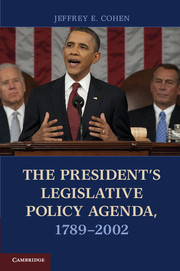Book contents
- Frontmatter
- Contents
- List of Figures
- List of Tables
- Introduction
- Chapter 1 The President's Legislative Policy Agenda
- Chapter 2 Studying Agenda Building
- Chapter 3 A Theory of Presidential Agenda Building and the Congressional Response
- Chapter 4 The Size of the President's Agenda, 1789–2002
- Chapter 5 The Substantive Content of Presidential Agendas
- Chapter 6 Divided Government and Presidential Policy Moderation
- Chapter 7 From the White House to Capitol Hill
- Chapter 8 Conclusion
- Bibliography
- Index
Chapter 5 - The Substantive Content of Presidential Agendas
Published online by Cambridge University Press: 05 November 2012
- Frontmatter
- Contents
- List of Figures
- List of Tables
- Introduction
- Chapter 1 The President's Legislative Policy Agenda
- Chapter 2 Studying Agenda Building
- Chapter 3 A Theory of Presidential Agenda Building and the Congressional Response
- Chapter 4 The Size of the President's Agenda, 1789–2002
- Chapter 5 The Substantive Content of Presidential Agendas
- Chapter 6 Divided Government and Presidential Policy Moderation
- Chapter 7 From the White House to Capitol Hill
- Chapter 8 Conclusion
- Bibliography
- Index
Summary
This chapter has two tasks. First, Chapter 4 presented strong support for the theory of congressional anticipations. As hypothesized, the president's agenda is smaller under divided than united government. During reelection years, however, minority presidents increase the size of their agendas, knowing that Congress will defeat their proposals, using those legislative defeats as a reelection campaign theme, the presidential blame game hypothesis. The analysis in Chapter 4 lumps all presidential proposals together. This chapter asks whether congressional anticipations affect presidential agenda decisions across policy types or are such presidential calculations specific to certain types of policies, such as domestic as opposed to foreign policies.
To address that question requires classifying each proposal by policy type. The second task of this chapter does this. Classifying proposals by policy type allows us to trace presidential attention to different policies across U.S. history. To date, no one has tried to track or describe presidential attention to different policies or issues across a long time. A major contribution of this chapter is providing such a description, which allows us to address an unexplored, yet important question – how does presidential attention to one policy area affect attention to other areas? Do policy areas compete for placement on the president's agenda? If one policy area attracts presidential attention, does that mean that other policy areas will have a harder time gaining the attention of the president?
- Type
- Chapter
- Information
- The President's Legislative Policy Agenda, 1789–2002 , pp. 140 - 187Publisher: Cambridge University PressPrint publication year: 2012

